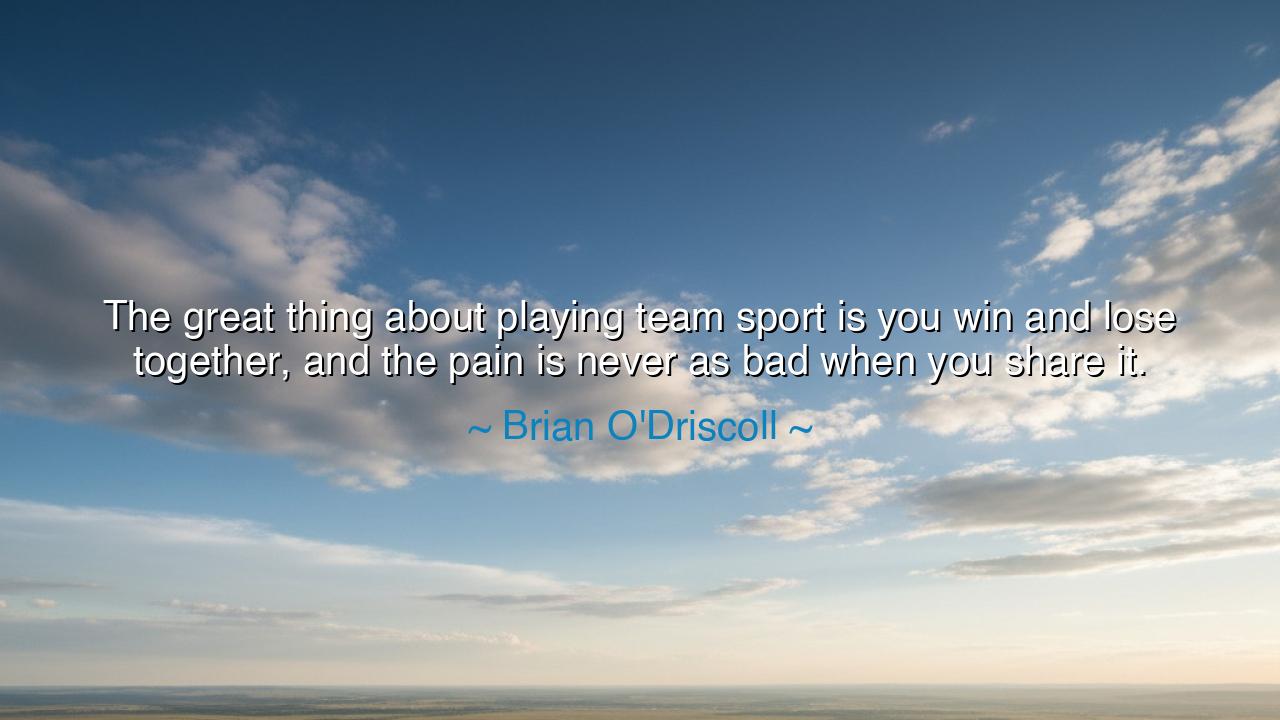
The great thing about playing team sport is you win and lose
The great thing about playing team sport is you win and lose together, and the pain is never as bad when you share it.






When Brian O’Driscoll, the great warrior of the rugby field, declared, “The great thing about playing team sport is you win and lose together, and the pain is never as bad when you share it,” he spoke not merely as an athlete, but as a philosopher of unity. In these few humble words lies a truth as old as humanity itself — that shared struggle transforms suffering into strength, and that no victory is complete unless it is born from brotherhood. O’Driscoll, who captained Ireland through triumph and trial alike, understood that the heart of every true team is not the scoreboard, but the bond of souls who fight as one.
In the ancient world, this truth was known by all who bore arms or toiled side by side. The Spartans, shoulder to shoulder at Thermopylae, understood that courage is magnified by comradeship. A lone warrior may fight fiercely, but the one who fights for his brothers fights with unbreakable spirit. O’Driscoll’s insight carries that same heroic essence into the fields of sport: that the game, like life itself, is a proving ground for loyalty, humility, and trust. When men and women labor together toward a common goal, they become more than individuals — they become a living unity, a single force bound by purpose.
To win together is a joy unlike any other. The victory belongs not to one, but to all. It is a song sung in many voices, each note lifting the others. In such triumphs, the ego dissolves, and what remains is the pure exaltation of belonging — the feeling that one’s effort has meaning beyond the self. But perhaps more powerful still is the other side of O’Driscoll’s wisdom: that to lose together is to discover the healing power of companionship. Pain shared is pain halved; sorrow that might have broken one heart can be borne by many shoulders. This is the grace of teamwork — that even in defeat, no one stands alone.
The origin of this wisdom in O’Driscoll’s life is no mystery. Through years of grueling play — blood, mud, and sacrifice — he came to understand that the true value of the game was not in the medals won, but in the men beside him. When he led Ireland to victory, he lifted the trophy for them all; when he fell short, he fell surrounded by those who shared his pain. He knew what the ancients knew: that suffering without isolation purifies rather than poisons, and that joy without vanity strengthens rather than corrupts. The team, like a family or a tribe, teaches us that the self finds its highest form in service to others.
Think of the story of the Apollo 13 mission, when astronauts Jim Lovell, Jack Swigert, and Fred Haise found themselves stranded in the darkness between earth and moon. Their craft was crippled, their lives hanging by the thinnest thread. Yet through teamwork — astronauts and engineers united across space — they found a way home. Each man depended utterly on the others, and in that dependence lay their salvation. Their victory was not the landing on the moon, but the return together. So too in life: our greatest triumphs are not always the ones that shine before the world, but the ones that bind us to one another in shared perseverance.
The lesson, then, is clear: never seek victory alone, and never suffer in silence. Life, like sport, is not meant to be played in isolation. When you win, give your joy to others; when you lose, lean on their strength. Build your team — your circle, your family, your fellowship — and tend it with loyalty and honesty. For a victory without others is hollow, but even a loss with companions is sacred. In sharing both, we become whole.
So, my child, remember this teaching: life’s greatest strength is found in togetherness. Seek not glory for yourself, but unity with others. Whether in the field, the home, or the heart, fight alongside those who share your spirit. When you fall, they will lift you; when they falter, your hand will steady them. And when, at last, you look back upon the days of your labor, you will not count the trophies or the scars — you will remember the faces beside you, the laughter after loss, and the knowledge that the pain was never too great, because you did not bear it alone.






AAdministratorAdministrator
Welcome, honored guests. Please leave a comment, we will respond soon